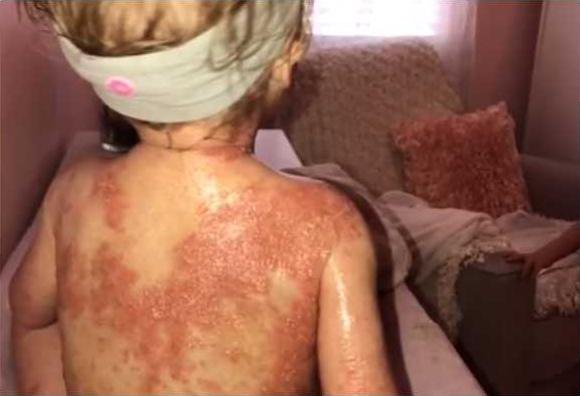Ashley Nagy from Arizona had just given birth to a beautiful baby girl when, a few days later, she noticed something was a little off. Her baby was getting sick, and Nagy was set on figuring out what was wrong with her little Charlie.
Not just a rash
She was only a few days old, but a rash started to form on her neck then spread to other places in her body. According to FaithIt, she initially suspected it was a milk rash, but as the red dots started to pop up on her armpits and legs, she knew there must be a deeper rooted issue.
The brand new baby received some antibiotics and cream to see if something could help with this mysterious rash, but they didnt help -- the rash kept spreading.
A life-changing diagnosis
After two months of trying to figure out what was wrong with her little baby, Nagy finally found answers when little Charlie was diagnosed with Psoriasis Vulgaris.
According to Medicine Net, Psoriasis is a noncontagious, chronic skin condition that produces plaques of thickened, scaling skin Psoriasis commonly affects the skin of the elbows, knees and scalp. The condition is most common in adults, which is why Charlies case was so rare.
When Charlie was six months old, the condition got so bad she had to stay in the hospital for three days. Nagy said in an Instagram post, We had TONS of doctors/nurses/interns/volunteers wanting to come see the psoriasis baby (I prefered to call her a unicorn). They hadnt seen anything like it, [sic] they said she was the youngest and most severe case they had seen.
A long journey ahead
Nagy now runs an Instagram account about their journey, keeps a positive attitude and is trying to educate everyone on Psoriasis. She talks about her experiences out in public with her little girl, and shes trying to let everyone know that Psoriasis isnt something to hide or be ashamed of -- even though it can be a pain.
She said, They look at her and then they look away and they try not to really stare. Nagy makes it a point to hug and kiss her daughter in public so everyone knows her condition isnt contagious and its nothing to be afraid of.
Psoriasis wont define her
Nagy wants Charlie to know her worth, and that her condition doesnt define who she is. In a particularly heartbreaking Instagram post, the mom wrote, Not seeking sympathy just awareness! I will not let this define her. I will keep fighting until I find a cure for her. Please keep CJ in your prayers.
Charlies family is keeping such a great attitude, and this little girl is such a strong fighter. Share this to spread awareness of psoriasis and Charlies story.
Not just a rash
She was only a few days old, but a rash started to form on her neck then spread to other places in her body. According to FaithIt, she initially suspected it was a milk rash, but as the red dots started to pop up on her armpits and legs, she knew there must be a deeper rooted issue.
The brand new baby received some antibiotics and cream to see if something could help with this mysterious rash, but they didnt help -- the rash kept spreading.
A life-changing diagnosis
After two months of trying to figure out what was wrong with her little baby, Nagy finally found answers when little Charlie was diagnosed with Psoriasis Vulgaris.
According to Medicine Net, Psoriasis is a noncontagious, chronic skin condition that produces plaques of thickened, scaling skin Psoriasis commonly affects the skin of the elbows, knees and scalp. The condition is most common in adults, which is why Charlies case was so rare.
When Charlie was six months old, the condition got so bad she had to stay in the hospital for three days. Nagy said in an Instagram post, We had TONS of doctors/nurses/interns/volunteers wanting to come see the psoriasis baby (I prefered to call her a unicorn). They hadnt seen anything like it, [sic] they said she was the youngest and most severe case they had seen.
A long journey ahead
Nagy now runs an Instagram account about their journey, keeps a positive attitude and is trying to educate everyone on Psoriasis. She talks about her experiences out in public with her little girl, and shes trying to let everyone know that Psoriasis isnt something to hide or be ashamed of -- even though it can be a pain.
She said, They look at her and then they look away and they try not to really stare. Nagy makes it a point to hug and kiss her daughter in public so everyone knows her condition isnt contagious and its nothing to be afraid of.
Psoriasis wont define her
Nagy wants Charlie to know her worth, and that her condition doesnt define who she is. In a particularly heartbreaking Instagram post, the mom wrote, Not seeking sympathy just awareness! I will not let this define her. I will keep fighting until I find a cure for her. Please keep CJ in your prayers.
Charlies family is keeping such a great attitude, and this little girl is such a strong fighter. Share this to spread awareness of psoriasis and Charlies story.








